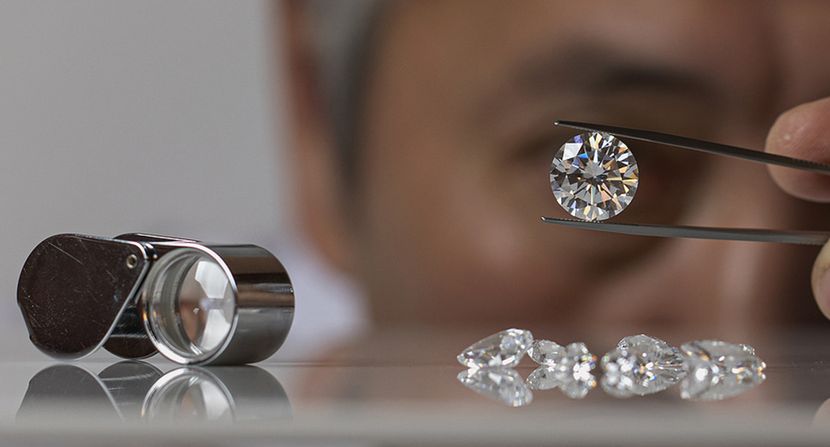How are Lab-Grown Diamonds Made?
Published: 12th August 2021

Lab-created diamonds are made by replicating the processes that result in the creation of natural diamonds.
Natural diamonds grow through intense heat and pressure which, over millions of years, transforms carbon atoms into beautiful and captivating gemstones we know as diamonds.
Lab-created diamonds grow the same way, only through a man-made process that takes several weeks, not millions of years.
Man-made diamonds begin with a tiny piece of diamond, known as a diamond seed. This seed is placed, sealed, inside a special chamber designed to mimic conditions within the Earth’s crust.
The seed, coated in pure carbon, will eventually transform into a synthetic diamond, chemically identical to a natural diamond.
There are two different methods used for lab-created diamonds; High Pressure-High Temperature (HPHT) and Chemical Vapor Deposition (CVD).
HPHT places intense heat (around 1,500 degrees Celsius, or 2,700 Fahrenheit) and pressure (1.5 million pounds per square inch) on the diamond seed and the carbon atoms coating it. On the other hand, CVD uses less heat and pressure, instead introducing a mixture of chemical gases that break down and harden into crystallized carbon atoms.
Both natural and lab grown diamonds have a place in the industry, however the difficulty in detecting one from the other obviously creates a problem.
The value of a lab grown diamond compared to a natural diamond is what drives the difference. Many people purchase diamonds as they identify with the romance of what a diamond stands for and they are creating memories in their lifetime. A lab grown diamond does not offer that same luxury. However it also does not command the same price. This is where the option lies and what is attracting a different demographic of consumer.
As long as stones being sold are disclosed for what they are, there should be no problem, but if full disclosure is not made then the consumer may be purchasing under a misapprehension. It is impossible to tell by the human eye whether a stone is natural or lab grown, which could be a major issue for any retailer, and clearly, selling a lab grown diamond as natural, would make its future value unsustainable.
It is therefore essential, for any retailer to have confidence in the product being sold, that all necessary checks have been carried out to determine a diamond's origin.
Undisclosed synthetic diamonds threaten to not only undermine trust in the diamond pipeline, but to also threaten the integrity of the wider jewellery industry. Definitive identification and certification of stones from expert gemmologists, using specialist testing equipment like the SYNTHdetect by DeBeers Group, is therefore crucial to protect pipeline integrity.
Diamond Verification Services is a completely independent organisation owned by Sheffield Assay Office. Offering state of the art technology we help our customers buy and sell diamond products with complete confidence, and provide a quick and easy process to confirm a diamond's true origin. For more information about how Diamond Verification Services can help you as a retailer or purchaser, please contact us on email at info@diamondverificationservices.co.uk or call +44 (0)114 2312121.
The Sheffield Assay Office was established in 1773, under an Act of Parliament and today the company assays and hallmarks the precious metals - silver, gold, platinum and palladium. Sheffield Assay Office is one of only four UK assay offices who all work to uphold the Hallmarking Act of 1973 and continue to ensure consumer protection for customers purchasing precious metals.
To find out more about the whole range of services offered by Sheffield Assay Office, such as our hallmarking and analytical services, please email us at info@assayoffice.co.uk or complete the contact form on our website at http://www.assayoffice.co.uk/contact-us ,
Sign up here to all the latest news from Sheffield Assay Office direct to your inbox